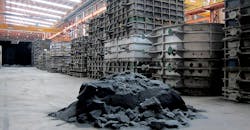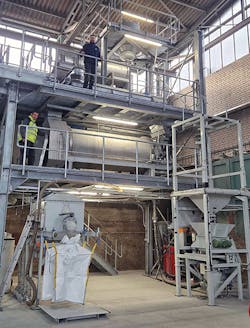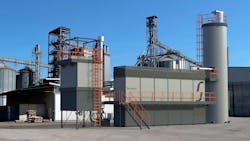New Directions in Recycling Foundry Sand
Many people have the impression that “sand” is an infinite resource, but metalcasters know that’s deceiving. Sourcing the right sand for a molding and coremaking program is basic production cost and frequently a sourcing problem too, as different grades offer different mineral or mechanical qualities. Sand is essential, but it can be a considerable expense.
"Availability of new foundry sand is already becoming a challenge, along with the need of providing new solutions to waste management,” according to the manager of a European metallurgical research center.
Sand that seems to have no further value to a foundry, spent bonded sand, can be an expense too – and worse, a liability. Rotary and vibratory systems that clean and recover molding sand are basic operating systems for most sand casting operations, but lately foundries are being presented with new options, and new imperatives. The difficulty of disposing of bonded sand in any affordable or acceptable way has brought forth new ideas in sand treatment and recovery.
The sand is not dried with heated air; rather, water is converted from liquid to gas using energy recovered from the condensation stage. Dust particles are removed in a patented fluid-bed cooling separator.
Process water is treated and maintained in a closed circuit. One metric ton of sand generates just 12 liters of wastewater, which represents the only freshwater requirement. Because the distillate is fully demineralized, it is better suited to washing the sand than fresh water.
Also, during the distillation process, condensation energy is recovered. Nearly all (95%) of the energy required for evaporation is recovered from condensation.
FSP’s process removes contaminants from used sands with 98% effectiveness, so the reclaimed material will have nearly equal mechanical strength and flowability as new sand. According to FSP, this means foundries can use it to fulfill up to 95% of their “new” sand requirements.
Compared to mechanical sand reclamation processes, the FSP process is claimed to be gentler to the material. Binders are removed without damaging the grains, and the process is practically dust-free. The fine-grain fraction of the reclaimed sand is less than 0.3% percent, according to FSP, meaning there will be no additional costs for dumping spent sand.
FSP managing director Stefan Zimmerman also emphasized the resource-saving opportunity of the process, noting that “new sand is not an endless resource.”A new option for recovering sand has emerged from a Finnish company, formerly called Finn Recycling and recently rebranded as Resand Oy. The Resand proposition involves a combination of thermal and mechanical sand treatment that has been in used by three foundries in Finland since 2019.
Earlier this year, Resand agreed to implement its process on a larger scale at the Siempelkamp foundry in Germany, which has sand requirements of almost 1,000 metric tons/day. Siempelkamp already recycles nearly all of its foundry sand, but "we want to move even faster in terms of active environmental protection, sustainability, and efficiency and increase our recycling rate further,” offered the foundry’s managing director, Dr. Georg Geier.
Resand also initiated a cooperative agreement with the Azertlan metallurgical technology center, to process foundry sands in Spain and Portugal.
"Availability of new foundry sand is already becoming a challenge, along with the need of providing new solutions to waste management, so this advanced sand recycling technology offers a clear opportunity for the foundry industry,” explained Xabier González, general manager of Azterlan. “As a technology hub, and in close collaboration with Resand we want to be a strong promoter of environmentally friendly practices and we see sand recycling and simultaneously reducing emissions from the foundry industry as a significant step forward in the right direction."
The two-part Resand process starts with a heat-treatment cycle to remove binder residues, followed by a mechanical drum sequence that separates any other impurities. The process can clean 2 to 4 metric tons of sand per hour, and according to the developer the regenerated sand has 95% of the mold strength of virgin sand.
In addition, Resand claims that its regenerated sand can reduce a foundry’s sand-purchasing and disposal costs by 10-20% annually, without any major capital expenses. And they further note that their process reduces CO2 emissions from sand use and transport by up to 80%.
"We want to enable a rethink in the foundry industry and make sand regeneration an integral part of business practices,” Resand CEO Kalle Härkki recently reported. “We offer foundries a rapid, modular and environmentally friendly solution that reduces the need for investment and saves foundries’ operational costs significantly."
In addition to treating spent foundry sands, Resand reported recently that it has the means to regenerate ceramic sand, such as the materials used to in 3D printing of sand molds. On the strength of this breakthrough, Resand now has a long-term “sand-as-a-service” (SaaS) service agreement with printer-developer and additive manufacturer voxeljet,. The contract covers cleaning and recycling of ceramic sand used by voxeljet at the sand regeneration unit in Resand's German service center in Germany.
The SaaS agreement also involves ceramic sand supplier ITOCHU Ceratech, with whom Resand has been testing ceramic sand reclamation. The Finnish, German, and Japanese companies are united by their ambition to promote sustainable development and to save resources.
"Resand aims to promote the responsible use of sand and we have already signed several service contracts for the cleaning of foundry sand in Finland and Germany. I am very excited that our cooperation with ITOCHU and voxeljet has proven that our technology works for cleaning different sand materials and that we can support the environmentally friendly use of materials in different industrial sectors," stated Härkki, the Resand CEO.


